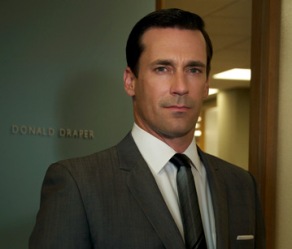
“We can’t eat prestige”
 As the ad executives at Sterling Cooper Draper Price close their fourth season on AMC’s award-winning series Mad Men, America’s most beloved Madison Avenue agency takes a very interesting turn, picking up their first pro bono account, the American Cancer Society. In the finale, after the fictional firm loses Lucky Strike, their biggest account that encompassed 60 percent of their billings, Donald Draper (Jon Hamm), writes an article for The New York Times entitled, “Why I Quit Smoking” that catches the interest of one of the oldest nonprofit organizations in the United States. A shocking shift, as the hit show’s first episode revolved around Draper’s search for the perfect tagline for Lucky Strike: “It’s Toasted.” But given tight financial constraints, the agency looks for opportunities to advance their brand and sees the promise and opportunity in partnering with the American Cancer Society. Initially, the partners laugh at the idea (“We can’t eat prestige,” says finance executive Lane Price), but Draper and his colleague, Ken Cosgrove, understand the value in signing new clients, and the value of philanthropy, pointing out, “There are a lot of big wigs on the board.”
As the ad executives at Sterling Cooper Draper Price close their fourth season on AMC’s award-winning series Mad Men, America’s most beloved Madison Avenue agency takes a very interesting turn, picking up their first pro bono account, the American Cancer Society. In the finale, after the fictional firm loses Lucky Strike, their biggest account that encompassed 60 percent of their billings, Donald Draper (Jon Hamm), writes an article for The New York Times entitled, “Why I Quit Smoking” that catches the interest of one of the oldest nonprofit organizations in the United States. A shocking shift, as the hit show’s first episode revolved around Draper’s search for the perfect tagline for Lucky Strike: “It’s Toasted.” But given tight financial constraints, the agency looks for opportunities to advance their brand and sees the promise and opportunity in partnering with the American Cancer Society. Initially, the partners laugh at the idea (“We can’t eat prestige,” says finance executive Lane Price), but Draper and his colleague, Ken Cosgrove, understand the value in signing new clients, and the value of philanthropy, pointing out, “There are a lot of big wigs on the board.”
While our current opinions of philanthropy are a touch more sincere, we now see where our mommies and daddies get their spirit of service. Corporate citizenship, as this story suggests, is a win-win situation. As real-life studies have shown, this approach:
- bodes well for company morale
- links firms with important causes,
- creates power through relationships.
Pro bono service takes the next step and infuses the power and prestige of business with the vision and passion of the nonprofit sector to give birth to a wealth of entrepreneurial capital.
Pro bono on Madison Ave
How ironic that at the headquarters of fictional ad agency, the Time & Life Building, would be the home to the Taproot Foundation’s New York office just fifty years later. Surely the Roger Sterlings and Don Drapers of today would be more open to the idea of skills-based philanthropic investment, a point proven by the sheer number of business professionals who apply–many from Madison Avenue–to engage in pro bono service through the Taproot Foundation. The culture of the corporate sector has changed dramatically, and the benefits are remarkable on both sides.
In our current marketplace, large corporations, like our partners at Gap, Inc. and Merck are investing in the creation of pro bono programs to promote the ethic of service and deliver much needed skills to nonprofits that support their communities. This cultural exchange has helped Taproot Foundation build the market for pro bono and changed the mode of “giving back” for generations to come.
Interested in seeing how other firms MAKE IT MATTER? Stay tuned for Carol Guttery’s ongoing blog series based on Making Pro Bono Work: 8 Proven Models for Community and Business Impact, a white paper released by Taproot identifying multiple unique ways that organizations can adapt and deliver pro bono service to address a variety of social issues and business goals (there are seven posts left, so keep up!).
It is inspiring to see Don Draper speak to the board of the American Cancer Society, giving them a strategy to change smoking behavior and create a real impact in people’s lives. Our pro bono consultants get to see this every day they volunteer with our nonprofit grantees.
Mad Men fans , do you think Don Draper or Peggy Olson is a pro bono hero? Do you know a pro bono hero in your community? Nominate them to be the Pro Bono Role Model of the Year at http://www.taprootfoundation.org/s/blog!
Join the American Cancer Society in leveraging expert pro bono support! Connect with skilled volunteers now for marketing, HR, tech, or finance services.
Francesca Krihely is a Development Fellow at the Taproot Foundation.

